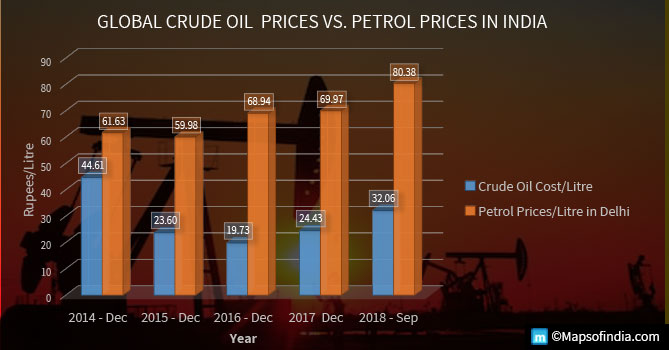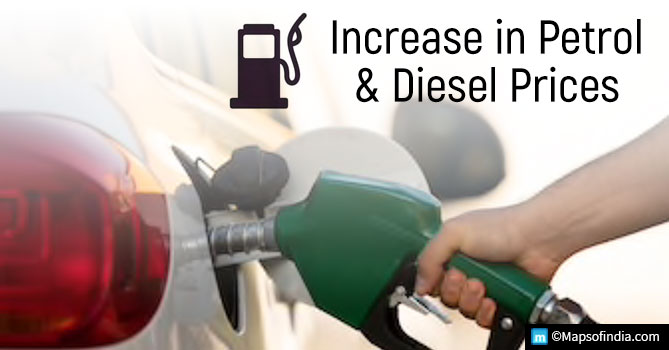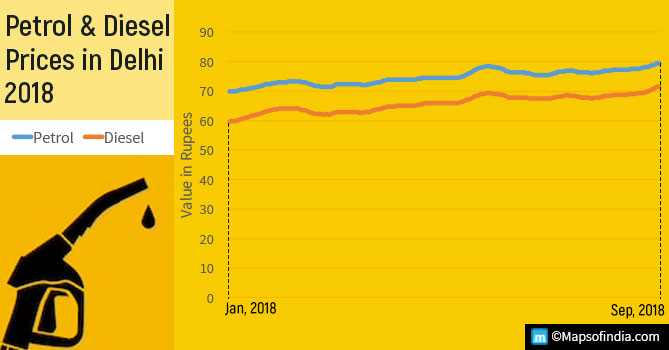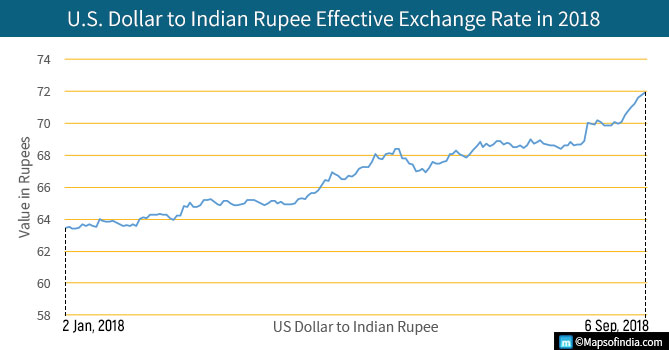हिंदी में पढ़ने के लिए यहां क्लिक करें
The petrol and diesel prices observed yet another hike as the country woke up on September 8, 2018. With petrol at Rs 80.38 per litre (Delhi), and Diesel at Rs 72.16 (Delhi), the country went into a wave of protest. Petroleum products are witnessing all-time high prices. In the past one month, Petrol rates have been increased by nearly Rs 3, and Diesel by nearly Rs 4.
Following the hysterics, the opposition has urged for a nationwide strike to protest against the soaring prices. With the state of Rupee already in a turmoil in the country, oil prices add yet another worry for our economy. But why are the prices going out of control?
A brief overview
India became the 6th largest economy of the world this year. However, 2018 hasn’t been particularly well for the pocket of the country, as well as of the common man. While Rupee hit a new all-time low, Petrol and Diesel shot up in the opposite direction, their prices touching the sky. The year opened with the Petrol at Rs 69.97 in the capital, and has seen a further upward spiraling moment since then. Diesel has had a similar fate, with a price of Rs 59.76 per litre in January, 2018. Today, both stand at an increased rate of at least Rs 10.
At the same time, Rupee began the year with the Dollar exchange value at Rs 63.807, and today the exchange rate stands at a mocking Rs 71.80. The situation becomes all the more alarming because of the deeply complicated relationship between Petrol, Diesel prices, and the status of the exchange rate. Different analysts have different reasons to give, for the swamp that we find ourselves in.
What effects the price of petrol and diesel
Exchange rate
India imports about 80% of its oil requirements. With the value of Rupee falling continuously against the US Dollar, the imports in turn become naturally costlier. This increases the already high pressure on Petrol and Diesel prices, nudging them to take an uphill route.
The state of Indian Rupee is not a secret to anybody in the country. While the Finance Minister has said there is nothing to worry about, and has explained that the Rupee is falling because of external reasons, there is no denying its effect on the oil prices.
The prices of crude oil

Crude oil is essentially the raw material from which petrol and diesel are extracted. The relationship between their prices is then simple, as well as self-explanatory. With the increasing rate of oil in India, one would expect the prices of crude oil to have increased in the same time period, too. Interestingly, however, the prices of crude oil four years ago were higher than their prices today. With a direct relationship, the prices of Petrol and Diesel should have also decreased. But, in reality, the opposite has happened.
Taxes
Excise duty on petrol/diesel is the tax levied on the sale of the fuel in question. Accordingly, a higher excise duty makes the sale of, say Petrol (or Diesel) more expensive. This increased expense makes its way to the ultimate price of the product. Hence, the burden on the consumer. The prices of Petrol in Delhi are the lowest presently, compared to the other metro cities. This is because of lower sales tax/VAT.
Conclusion
The Prices of petrol and Diesel are affected by a multitude of factors. Hence, the present-day scenario cannot be pinpointed to just one single cause. However, the tensions in the global economy play a key role in the scenario. For example, due to the constrained US-Iran relations, the former has asked countries not to import any oil from Iran. On an average, India imports 592,800 barrels of crude oil from Iran per day, which has now dwindled.
Other factors like the exchange rate of the domestic currency, prices of crude oil, internal taxes, excise duty etc also play an important role. The excise collection from petroleum products has more than doubled in the last four years. Between November 2014 and January 2016, the excise duty had been raised nine times. In Budget 2109 too, the Union government increased the excise duty and cess each on petrol and diesel by Rs 1 per litre. Certainly, this puts an upward pressure on the prices of petroleum products. The revenue collection was Rs 2.016 lakh-crore in FY 2017-18, which increased to Rs 2.579 lakh-crore in 2018-19.
While the opposition criticises the government for the tormenting prices of petrol and diesel around the country, the common man waits for some ray of hope. Whether or not the burden will decrease, is something that will only be clear in the days and months to follow.
Read More:
Top 10 reasons why vegetable and pulses prices keep soaring in India
What Is The Government Doing To Curb The Rising Vegetable Prices?
Why LPG price rising in India?
Why is the gold price falling in India
Onion price rise in India– A critical issue








